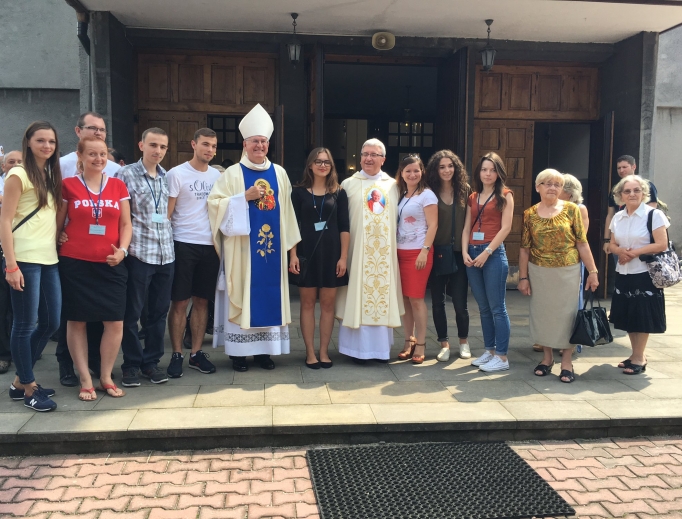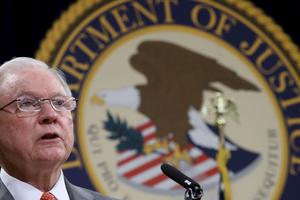Leader of US Bishops: ‘Young People’s Gifts Are to Build Up Church and the World’
Archbishop Joseph Kurtz says World Youth Day reminds the world that ‘the hearts of young people are stirred by the power and grace of Christ.’

We want to build up the gifts young people bring to the Church and the world, stressed Archbishop Joseph Kurtz, Archbishop of Louisville, Ky., and president of the U.S. bishops’ conference, in an interview with the Register in Krakow on July 26, the day before Pope Francis’ arrival in his Polish predecessor’s homeland for World Youth Day.
The United States sent the fifth-largest number of young people, after Poland, Italy, France and Spain, to WYD.
Among a variety of topics, the archbishop discussed the importance of World Youth Day for young people and how he views Pope Francis’ relationship with young people. He also speaks about his own participation and what he believes to be the secret to WYD’s longevity, more than 30 years after John Paul II founded the youth event.
What is the meaning of World Youth Day for young people?
Since St. John Paul II began it — now 31 years ago, can you believe it? — World Youth Day has become a magnet, not only for attracting young people, but also to give occasion in almost every diocese and parish for a bringing together and calling forth of young adults. … I’ll call it “the experience” of World Youth Day — meaning it includes the event itself, that which leads up to it and the aftermath — for it has, like a ripple of a wave, a much wider span in touching the hearts of people, espcially through the number of people who access it through social media. The WYD will stir enthusiasm, similar to what we saw after Pope Francis’ visit to the United States last September.
Why are you accompanying the young people here?
I am accompanying our young people from the Archdiocese of Louisville. Also, I’ve been priviledged to be asked to be a catechist, to give some catechetical leadership. Thirdly, in my role as president of the U.S. bishops’ conference, I have the opportunity to join with Pope Francis and the world’s bishops in supporting the importance of young adults and our building up, if you will, the gifts that young adults bring to the Church and to the world.
Can you enlighten us about what you’ll be speaking about?
The themes are very much taken from the message Pope Francis has given for World Youth Day. There is a structure. The first day is about the gift of mercy and what it means to receive this gift. The second day looks at how mercy is something that first must be received before it is shared. And the third day examines what it means to share mercy. This will emphasize the spiritual and corporal works of mercy.
Can you explain to us how these catechetical sessions work?
It’s important to note that the catechesis is not just “one way.” It’s designed in such a fashion that we catechists are encouraged to present for maybe 20 minutes, but then to have 20 or 30 minutes for interaction. This interaction can be a witness, a young adult sharing an experience that he or she has brought with him or her, or it could be a question that we can interact with. I am eager to be engaged in that process because it’s catechesis at its best, in which there is an engagement and an interaction over the truth and love of Christ.
How do you view the relationship between Pope Francis and the young people?
I think it’s super. [Smiling.] Our Holy Father has tended to bring out the best in people. Pope Francis has a way of stirring hearts and bringing about enthusiasm, so I can’t wait for his coming. His letter, by the way, that frames World Youth Day, is very good, because it calls young people to the love and mercy of Christ. His message and this event also challenge young people to not simply go with a culture that expects very little of them, but, rather, sees a great responsibility in the gifts that God has given them.
What do you hope will be the lasting impact of this World Youth Day?
Well, that’s a good question. I just did a little bit of an essay as part of our World Youth Day, to be released on Wednesday, Aug. 3, and I concentrated primarily on the fact that as we all are returning to our homes, the following Saturday, Aug. 6, is the Feast of the Transfiguration. It is the very time in which Jesus led Peter, John and James up Mount Tabor. They experienced an encounter with Christ. St. Peter wanted to stay up on the mountain, and Jesus said, “No. Come back into the valley, but don’t let the memory fade.”
And that’s the theme that we have here. In my essay, I encourage the young people to journal, if they have not already done so. While their memory is still active, even if it’s once they’ve gotten home, I encourage them to begin to write the experiences down, because I think that allows the experience of a pilgrimage to live on. So I would say that there’s a sense of renewed faith that I hope will come into the hearts of everyone. Also, I encourage them, if they’ve made a friend, to contact and write to that person. Even if they are on the other side of the world, that’s what builds up that sense of communion in Christ, which is the Church.
Pope John Paul started World Youth Day more than 30 years ago. What is the secret to WYD’s longevity?
Well, in every age, the hearts of young people are stirred by the power and grace of Christ. I really believe that it’s not simply hype, nor how things are organized, but that there is a genuine stirring. Our Holy Father’s theme last year was about a stirring for happiness. And, this year, his theme is the stirring for mercy. And I think we, at our best, when we get to know ourselves to our depths, we realize we need to live our lives based on something permanent. I suspect that World Youth Day will bring out the best in young people.
Can we speak about how the Church in the United States is participating in this World Youth Day? Can you tell us more about the young Americans here?
This WYD will stir enthusiasm. That’s what happened when Pope Francis came to the United States last September, and I think this will connect with that.
There is a particular theme that I think Pope Francis talked about in his letter, and I think goes back to John Paul II and goes back the Second Vatican Council: They have been thinking about this. In the document of the Council, called Gaudium et Spes (“The Church and the Modern World”) — John Paul II had a major hand in this — there’s one paragraph in which he says, “While the world promotes self-assertion, the Church in Christ promotes self-gift.” And I think that that’s a handle worth carrying for a while — because I think in many ways we are living in an age in the United States in which people are pushed to assert themselves and be what they want to be. And it’s a different emphasis to begin by saying, “Well, in a way, to get the life we have is a gift given to us that restores us.” So giving that gift is a gift to others. So it’s the stirring of love, rather than selfishness, that leads us out of ourselves. That’s, I think, a major theme of Pope Francis: to move out of yourself, to go to the margins of the world, and to see a perspective of life differently. I think that’s important.
Vatican correspondent
based in Rome but has been reporting from
Krakow for World Youth Day.
- Keywords:
- archbishop joseph kurtz
- bishops
- deborah lubov
- st. john paul ii
- world youth day
- world youth day krakow
- young catholics
- young people

















